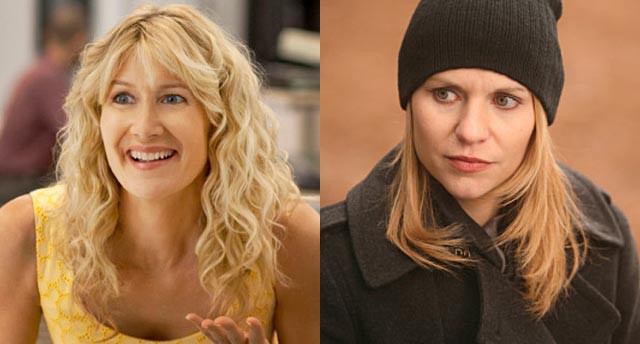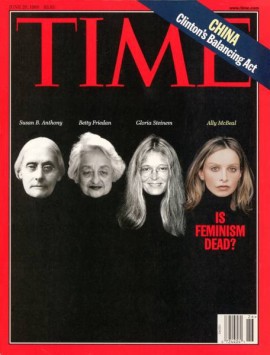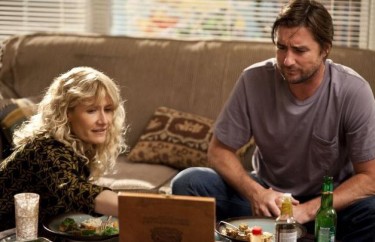'Homeland' And 'Enlightened': Women On The Verge Of Nervous Breakthroughs
by Michelle Dean

Mention Lindsay Lohan to me and you’ll be treated to an excoriation of the joy with which this culture greets your average female public breakdown. As such, I’ve surprised myself this fall with my absorption in the personal and professional unravellings of two female television characters: Carrie Mathison of “Homeland” (Claire Danes) and Amy Jellicoe of “Enlightened” (Laura Dern). If you’ve also been watching those shows, you might question my yoking them together. Carrie and Amy could not occupy (heh) two more different dramatic universes. “Homeland” is a taut, quickly paced thriller about terrorism whose signature gesture is to end each episode on the edge of a cliff; while “Enlightened” is a more meditative, patient, voiced-over and incredibly intelligent dramatization of a sort of Eat, Pray, Love moment in the life of one not-particularly-remarkable woman in California.
All the same, I think of both their lead characters, Carrie and Amy, as a pair. Both are struggling with the place of work in their lives; neither is particularly adept at maintaining healthy romantic relationships. Both are also suffering from mental illness, although Carrie’s is identifiable as bipolar disorder, whereas Amy seems to suffer from a more diffuse sort of ailment on the anxiety/depression spectrum. In their twin sufferings they have become talismans for me in a way that no more overtly politicized depiction of ladies on television has ever quite done — not Peggy of “Mad Men” nor, and this pains me to admit it, even Buffy. They’re articulating something new about vulnerability in women that I haven’t seen said before, at least not in precisely this way, on television. And I, for one, am hooked.

I use the word “vulnerability” advisedly here. I’m old enough to recall the fall of the Berlin Wall as an interruption of a rerun of “Growing Pains” (or was it “Who’s the Boss?”). Those of you who share that description probably also remember that charming interlude in our TV-watching lives where we were invited to contemplate “Ally McBeal” as at once an icon and Grim Reaper of female liberation. Time got in on that game with typical subtlety and thoughtfulness by running a cover image of the disembodied heads of Susan B. Anthony, Betty Friedan and Gloria Steinem floating in a black void alongside Ally’s and the question, “Is Feminism Dead?”
The particulars of the accompanying essay, penned by (oh brother) Ginia Bellafante, are not worth rehashing. For one thing, it’s about a show that is now largely and rightfully forgotten. (Though I do sometimes wonder whatever happened to that piano lady.) For another, the essay itself is pretty bad. (In Bellafante’s eyes, Katie Roiphe’s greatest sin up to then was appearing in a Coach ad.) And these arguments always take the same utterly depressing tack: step out of line, make a mistake, enjoy cute babies, feel badly, cry at work, be, in other words, wounded and imperfect, and your failings are judged not just as your own, but as those of the entire sisterhood, q.e.d.
Most shows about women have, perhaps unintentionally, made themselves susceptible to this boring, repetitive debate because they simply cannot stop announcing at every available opportunity that they are Television Shows About Women, Goddamnit. (Let’s call them TSAWGs.) Whether you want to blame TSAWG creators or network-driven marketing campaigns is immaterial — the fact is that we are meant to see Ally and Buffy and, even to a certain extent, Peggy as leading archetypal female lives, so when they are weak and/or strong and/or prone to cute outfits, we are invited to see “women” as being the same way. This sets a trap for the critic who, while believing in equality, wants her art to be something other than a position paper, as I can say from experience. For your reviews, you then have to work out how to simultaneously applaud any dramatic interest in women’s lives — it being rare enough to begin with — while registering any reservations you may have that such a pat thing as “women’s lives” exists. Look. Of course I’ve known Allys and Buffys and Peggys, but I’ve known a hundred other kinds of women too, not all of them middle class and/or white. (I know!) The idea that we share, as women, necessarily common interiorities — rather than common treatment from the world outside our tiny, skull-sized kingdoms — well, it is, and always has been, to put it politely, utter bunk. Flightiness and envy and shame — male, female, whatever, we all have to deal with those emotions. (Go into any bar and you’ll find as much emotional need at a table of male investment bankers as you will at the girls’ night out a few feet away; there’s not as much distance between “you go, girl” and Hugo-Bossed chest-beating as most would like to think.)
Anyway, my point is this: it’s important that neither “Homeland” nor “Enlightened” have arrived at the parade bearing that About Women banner. Their female leads don’t have to hold up any feminist or post-feminist placards. (Are we at post-post-feminist, pop-culturally speaking, yet? I keep losing track.) Without that freight, the shows can stumble on to obvious-and-yet-not-obvious insights that TSAWGs have traditionally resisted depicting, and to boot get to do so without having to claim for their (also white and middle class) heroines anything other than their own individuality.
Take, for example, the most egregious mistake the otherwise competent and ambitious CIA agent Carrie has made in this inaugural season of “Homeland”: when she crosses the line and sleeps with Brody, the ex-POW target she’s investigating. The choice is (at least initially) presented to us as one outside of traditional TSAWG protocol when Our Heroine sleeps with Our (Anti)hero. What Carrie does is heedless and impulsive, to be sure, but her choice to do it isn’t about lunar cycles or Women In Love or even, in a gesture favoured by analogous TSAWGs like “Alias” and “Damages,” an attempt to avenge some perfect idealized man assassinated in a bathtub at the outset of the series. It simply comes out of nowhere, as much bad-idea sex does. (Or so I’ve, uh, heard.)
Carrie later tells Brody that she originally slept with him to trick him into confessing that he’d been “turned” as a POW in Iraq. But a more recent admission to her mentor Saul, of her fear that she will always be “alone,” suggests a more traditional explanation. Perhaps the answer is both, which would be something quite a bit more like real life, wouldn’t it, than an either/or diagnosis. Admittedly, it’s often hard to say, in “Homeland,” which ambiguities are intentional. The creators are veterans of “24,” not a show that evinced a sophisticated understanding of human psychology and thus it’s likely that ulterior motives are here as plot devices rather than as tools to deepen character. Whatever the case, Angela Chase Danes manages to take the chaotic writing and unify Carrie into a difficult, loud, excessively blunt mess of a person. It’s not so much that she makes Carrie sympathetic as she makes her recognizable.

In that sense Amy, as played by Laura Dern, is Carrie’s polar opposite, far easier to like in her own cringeworthy way. Admittedly, the topology of Mike White’s “Enlightened” is more familiarly TSAWG-ish. Amy’s vulnerability stems from what seems like the usual suspects of TSAWG breakdowns: a difficult mother, a miscarriage, the (at least partially) consequent breakdown of a marriage, a workplace affair. The potential for the feminine cliché seemed, as I watched those first few episodes, very high. But then I changed my mind. [In “Enlightened,” these problems are not presented to us as “female” — though Amy does occasionally harbor certain ambitions for sisterhood at Abbadonn, the company where she works — but rather as existential. This shift of frame is subtle but important. Amy gets to lay claim to questions about meaning and loss and love in terms that are so abstract as to be universal and yet that don’t simply capitulate to the (old/white/male) terms of traditional philosophy.
For those of you not yet watching, such an ethos may make “Enlightened” sound fatally pretentious and vague. And it could be — but it isn’t. Somehow White’s writing manages to straddle the ridiculous and the touching in utterly unmanipulative ways. Here is the scene I’d use to make my pitch to you to start watching: In the fourth episode, Amy goes on a rafting trip with her ex-husband, one that she clearly hopes will renew the bond they once felt. It ends instead with him getting high and confused and fulfilling every cliché of the deadbeat ex-husband you can imagine. He loves Amy, it’s clear, but the situation is nonetheless hopeless. And Amy, well, her reaction is neither to run out and buy tissues nor to declare herself “done with men.” Instead, she just ruminates:
You can try to escape the story of your life but you can’t, it happened, the baby died, the dog died, the heart broke, I knew you when you were young, I know your heart broke, too. I will know you when we are both old and maybe wise, I hope wise. I know you now. Your story. Mine isn’t the one I would have chosen in the beginning but I’ll take it. It is my story. It’s only mine. And it’s not over. There’s time. There is time. There is so much time…
Amy delivers this speech while standing in a rose garden on a wide and sunny day. There is no walk home in the rain, with the strums of a strong woman’s ballad playing underneath. Nor some vow of renewal and a triumphant martini with three girlfriends, (as we traveling foursomes of women are wont to enjoy). Shedding these cliches, Amy’s Zenlike rejection of hysterical, cuticle-and-life-destroying anxiety about whether she should marry or settle or have kids or freeze her eggs or opt out or keep working or stop being such a goddamned rare spotted owl — well, for the love of Christ, it’s so downright refreshing, even revolutionary, to see these questions thought about in less all/nothing, either/or, fearmongering terms.
Should this trend catch on, of course, some people inevitably may be disappointed — the producers of reductive and silly magazine covers, for example, who won’t be able to wring the same sensationalism from “What Me, Marry?” and “Marry Him!” — but I think we could probably learn to carry on anyway.
Related: Laura Dern Is Our Only Hope For Bringing David Lynch Back
Michelle Dean writes in a lot of places, now. Follow her onTwitter
